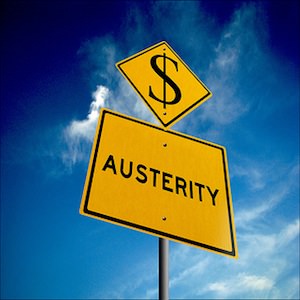Austerity and the Threat to Democracy Around the World
The “sequester” is actually, of course, the American form of austerity, or cutbacks in government spending during a recession. Austerity, or stingy government in Europe has kept employment extremely depressed compared to what it would have been with government stimulus, as Paul Krugman argues.
This report was first published on Juan Cole’s website, Informed Comment.
The “sequester” is actually, of course, the American form of austerity, or cut-backs in government spending during a recession. Austerity, or stingy government in Europe has kept employment extremely depressed compared to what it would have been with government stimulus, as Paul Krugman argues.
Saturday, there were massive protests throughout Portugal against Scrooge policies by the government, which have so destroyed the country’s economy that 2% of the population has fled abroad for jobs in the past 2 years alone. On Friday, Greek workers staged a huge general strike. In Italy, anti-austerity feeling made grumpy comedian Beppe Grillo and his party the swing vote in the new parliament. Grillo may single-handedly destroy the Euro zone. European newspapers rather amusingly demanded that Grillo now ‘take responsibility’ and ‘tell us what he wants.’ He is a contrarian comedian. It would be like having Robin Williams or Tracy Morgan as the swing vote in Congress, with the press hounding them for their agricultural policy and asking them about the dangers of deflation. But Grillo’s ascendancy, while less alarming than the resurgence of the Greek far Right, is a manifestation of the rejection by the Italian public of the long dreary road prescribed by the ‘troika,’ (The International Monetary Fund, the European Union, the Central Bank), of further government cut-backs, reductions in minimum wage, high unemployment, no hope.
While for some odd reason the Middle East does not usually get analyzed with the same social science tools as Europe, the political crisis in Egypt is related to the Muslim Brotherhood government’s austerity program. The latter, as Samuel Knight argues, is being pursued under pressure from the International Monetary Fund. Secretary of State John Kerry is in Cairo, also urging acceptance of the austerity program. Austerity is estimated to have reduced Egyptians’ real income by 3 percent in January alone. Tunisia is doing better than Egypt economically, but the parliament, dominated by the religious Right, is also tempted by austerity measures, seeking to trim a point off the budget deficit this year while seeking 4.5% growth. While letting the value of the Tunisian dinar fall would hurt consumers with regard to imported goods, it would make Tunisian textiles and tourism more affordable for those abroad. Tunisia’s exports are hurt by European economic problems, and the country would do well to develop more Asian customers (Brazil has had success reorienting exports to the Pacific Rim). Likewise, although Yemen’s economy improved in 2012 after a 10 percent drop in the revolutionary year of 2011, if anything the government budget deficit of 5.5% is not big enough to stimulate the economy properly.
Reducing the state budget at a time of economic contraction is the opposite of what the great economist John Maynard Keynes prescribed. When the economy is in the doldrums, the businesses are skittish about investing their money, and so keep it in the bank. The only force, Keynes argued, that can and will risk putting a lot of money into the economy during a deep recession is the government. Of course, the government has less money at that point, too, since tax receipts are reduced. So it will simply have to spend money it doesn’t technically have, i.e. go into deficit and print extra paper money. The extra paper will, obviously, lose some of its value. But that loss can have benefits, too, since it will make the goods produced by the country less expensive abroad, and spur exports.
This argument is straightforward for most countries, and it is mysterious why European and some Middle Eastern governments reject it. It is complicated in the US by the position of the dollar as a reserve currency and by the fall of manufacturing to only 20% of the US economy. The former means that large budget deficits don’t necessarily reduce the dollar’s value significantly, because the US only holds about a third of the world’s dollars and there is a lot of confidence in its value. The latter means that even when the dollar falls against the yen or euro, the jump in exports is limited to a fifth of the economy and domestic services don’t get much of a boost. But actually these peculiarities of the US economy are not arguments for austerity; on the contrary, the reserve dollar allows the US to do stimulus without as much pain as one would otherwise expect.
Instead, the Tea Party has forced the US into an artificial crisis with the ‘sequester,’ taking $100 bn. a year out of the economy for the next ten years, which will cut half a point of economic growth and harm workers, keeping unemployment high– not to mention the harm it likely will do to medical research, higher education, etc. That this austerity is being pursued by the GOP in part in hopes of disillusioning voters with President Obama in his second term is fairly obvious, but it is also in order to protect the 2003 Bush tax cuts for the wealthy, 80% of which have been retained. Sequester, as usual with these things in the US, is actually a tax on the middle classes to benefit the wealthy, since it preserves undeserved tax cuts for the latter by reducing government services for the former.
That austerity does not work economically should be clear. But that it creates populist discontents that are shaking southern Europe and could derail Middle East democratization is even more alarming. The world needs stimulus, not Scrooge government if it is to pull out of the crisis kicked off by corrupt bankers in 2008.
Your support matters…Independent journalism is under threat and overshadowed by heavily funded mainstream media.
You can help level the playing field. Become a member.
Your tax-deductible contribution keeps us digging beneath the headlines to give you thought-provoking, investigative reporting and analysis that unearths what's really happening- without compromise.
Give today to support our courageous, independent journalists.






You need to be a supporter to comment.
There are currently no responses to this article.
Be the first to respond.